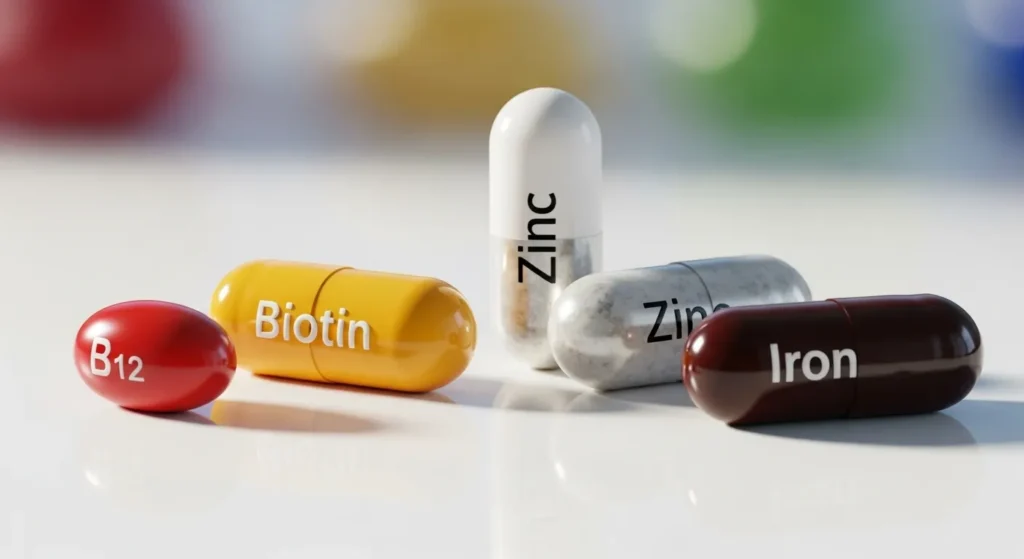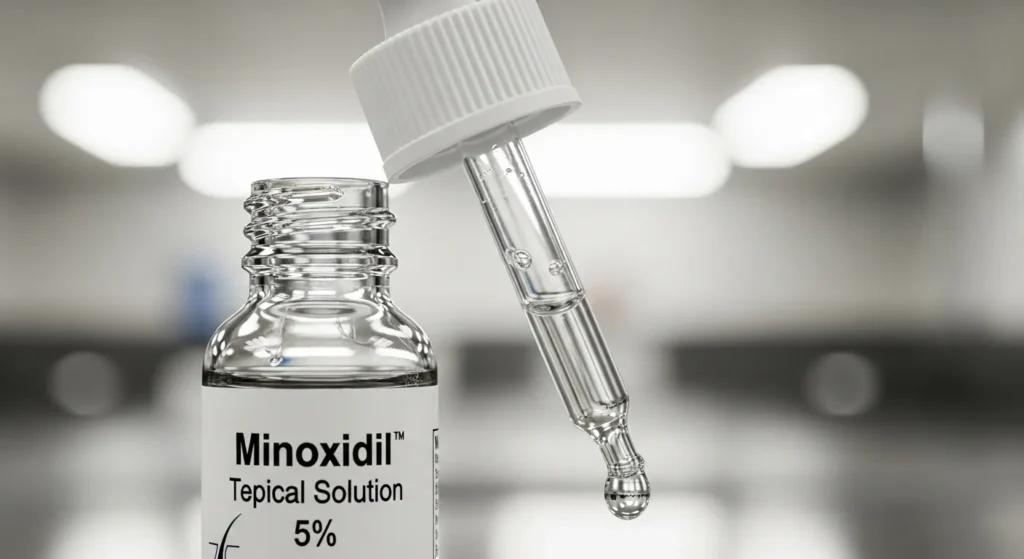Experiencing hair thinning after starting metformin? You’re not alone. Metformin hair loss recovery is a common concern among individuals managing type 2 diabetes or PCOS.
This article explains how metformin can contribute to hair loss, outlines a realistic recovery timeline, and offers medically grounded strategies to support regrowth. Discover how to reduce shedding, restore hair health, and regain confidence with expert-backed guidance.
Can Metformin Cause Hair Loss?

Common Side Effects of Metformin
Metformin is generally well‑tolerated but can lead to gastrointestinal upset, vitamin B12 deficiency, and—less commonly—hair thinning or shedding. Medical literature indicates that nutrient depletion and hormonal shifts may indirectly impact follicles.
Scientific Evidence on Metformin and Hair Loss
Although direct causal studies are limited, several case reports link long‑term metformin use to hair thinning. Experts suggest that nutrient deficiencies (especially B12) and underlying hormonal imbalances might interplay rather than metformin being directly toxic to hair.
Hormonal Imbalances and Nutrient Depletion
- Vitamin B12 deficiency: Metformin impairs B12 absorption, which can weaken hair follicles.
- PCOS & insulin resistance: Hair thinning may reflect hormonal disturbances more than medication itself.
- Rapid weight loss or stress during metabolic changes can trigger telogen effluvium, amplifying shedding.
Why Does Metformin Lead to Hair Loss in Some People?
B12 Deficiency and Hair Follicle Disruption
Vitamin B12 plays a vital role in DNA synthesis for hair follicle cells. Deficiency can cause weakened strands and increased shedding. Routine bloodwork is essential to monitor levels and correct deficiencies early.
PCOS, Insulin Resistance & Hormonal Triggers
Many women taking metformin for PCOS already face elevated androgens or insulin-related hair loss. Metformin may help improve insulin sensitivity, but if used without proper hormonal management, it doesn’t address the underlying causes of hair thinning.
Stress, Weight Loss & Other Confounding Factors
Sudden weight loss or lifestyle changes associated with treatment can contribute to telogen effluvium—a temporary shift of hair from the growth phase to the shedding phase. These factors often overlap and reinforce hair loss.
Will My Hair Grow Back? Understanding Metformin Hair Loss Recovery
Is the Hair Loss Temporary or Permanent?
In most cases, shedding from metformin is reversible, especially when caught early. The longer you address the root causes—like B12 deficiency or hormonal imbalance—the better the prognosis.
Factors Affecting Hair Regrowth
- Duration of treatment: Long‑term users may take longer to recover.
- Nutrient status: Deficiencies slow recovery unless corrected.
- Age and genetics: Younger individuals or those with strong regrowth potential fare better.
- Underlying conditions such as PCOS, diabetes control, and overall health.
Average Recovery Timeline
- Minor shedding may resolve within a few months.
- More significant thinning often improves by 3–6 months when underlying issues are managed.
Metformin Hair Loss Recovery Timeline
| Time Frame | Expected Progress |
|---|---|
| 0–4 weeks | Adjust medication/dose; begin supplementation |
| 1–3 months | Shedding slows; initial regrowth signs |
| 3–6 months | Noticeable regrowth phase begins |
| 6–12 months | Full regrowth potential (case‑dependent) |
First 4 Weeks – Stopping the Trigger or Adjusting Dose
- Check B12 and iron levels.
- Discuss dose adjustment or temporary cessation with your endocrinologist.
- Start supplements only under medical advice.
1–3 Months – Signs of Reduced Shedding
- Observe reduced follicular drop-through in the shower or brush.
- Begin topical treatments like minoxidil if recommended.
- Prioritize nutrition and gentle hair care.
3–6 Months – Initial Regrowth Phase
- Fine hairs and baby strands appear.
- Continue consistent regimen: supplementation, topicals, scalp massage.
6–12 Months – Full Recovery Potential
- Full density may return if no permanent follicle damage.
- If thinning persists, consider referral to a trichologist or dermatologist.
Effective Ways to Regrow Hair After Metformin Use
Nutritional Support – B12, Biotin, Zinc, and Iron
- Get serum B12, ferritin, and D‑cup levels tested.
- Replace deficiencies with medical-grade supplements.
- Consider biotin or zinc only after lab confirmation and under supervision.

Topical Treatments – Minoxidil, Peptides
- Over-the-counter minoxidil (2% or 5%) supports regrowth for many.
- Peptide serums or botanical actives may offer added benefit.
- Apply as directed, and manage expectations realistically.
PRP or Mesotherapy for Targeted Hair Regrowth
- Platelet-rich plasma (PRP) injections can boost blood flow and stimulate follicles.
- Mesotherapy delivers micronutrients directly to the scalp.
- Consult a certified provider for appropriate dosing and timeline.
Lifestyle Adjustments – Stress Management, Balanced Diet
- Stress reduction—through mindfulness, yoga, or hobbies—can improve hair cycle health.
- Eat a varied diet rich in protein, leafy greens, and healthy fats.
- Stay hydrated and avoid extreme caloric restriction.
When to See a Doctor or Specialist
Red Flags Indicating Ongoing Hair Loss
- Increased shedding beyond 6 months.
- Patterns of thinning or bald spots.
- Signs of autoimmune hair loss (e.g., patchy alopecia areata).
Role of Dermatologists, Endocrinologists & Trichologists
- Endocrinologists manage metabolic conditions and medication.
- Dermatologists/trichologists evaluate scalp health and prescribe treatments.
- Request a medical consultation if basic interventions don’t yield improvement.
Expert Tips for Supporting Healthy Hair Growth
- ✔ Pro tip: Get baseline labs (B12, ferritin, D‑cup) before starting supplements.
- ✔ Use gentle hair care: avoid harsh dyes, heat styling, and tight hairstyles.
- ✔ Combine medical & holistic approaches: e.g., minoxidil + scalp massage + improved nutrition.
- ✔ Track progress: take monthly photos under consistent lighting to monitor changes.

FAQs About Metformin and Hair Loss
Q: Can I stop metformin to prevent hair loss?
A: Never stop or change metformin without medical advice. Instead, consult your doctor about dose adjustment or adding supplements.
Q: How long does it take to see regrowth?
A: While some respond within 1–3 months, most notice visible regrowth by 3–6 months after addressing deficiencies and optimizing treatment.
Q: Is hair thinning from metformin permanent?
A: Rarely permanent if action is timely. Absence of regrowth after 12 months may warrant further investigation.
Q: Should I take supplements with metformin?
A: Only after lab confirmation. Common supplements include B12, iron, and biotin, but use therapeutic doses advised by a clinician.
Q: What are the best treatments to speed up recovery?
A: Combining supplements with topical treatments and lifestyle changes offers the highest potential, plus targeted therapies like PRP if needed.
Concerned About Metformin‑Related Hair Loss?
Speak with our hair restoration and metabolic health specialist in Islamabad for a personalized recovery plan. Whether it’s persistent thinning, patchy regrowth, or biochemical deficiencies, we offer evidence‑based solutions including PRP therapy, prescription-grade supplements, and integrative lifestyle coaching. Book a Consultation with Dr. Rana Irfan.
